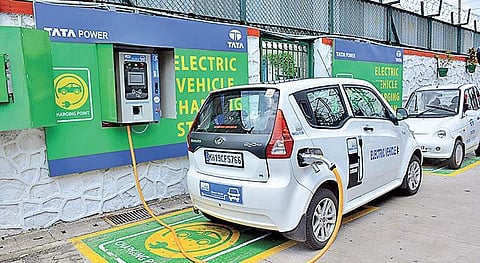

Eying the establishment of a robust electric vehicle (EV) charging infrastructure in India, the Union government has come up new guidelines for the setting up of charging stations across India.
The ‘Charging Infrastructure for Electric Vehicles-Guidelines and Standards’ circular, sent out this week, aims to enable the faster adoption of EVs and support the development of EV charging businesses throughout the country.
As per the circular, private charging stations will be permitted at all residences, meaning buyers of electric cars and scooters can charge their vehicles at home and distribution companies (DISCOMs) are to facilitate the same.
The Ministry of Power has also said that no license will be required for setting set up a public charging station and any individual or entity is free to set up one if they follow the standards and guidelines. Some of the guidelines mandate that there should be at least three fast charging points in public charging stations -- one each of the CCS (min 50 kW), CHAdeMO(min 50 kW) and Type 2 AC(min 22 kW) configuration.
The power ministry has also provided a set of guidelines relating to the locations of the public charging stations. There will have to be at least one charging station within a 3 km by 3 km grid and one every 25 km on highways.
For long range and heavy duty EVs, there will have to be at least one station on each side of the highway every 100km. As for affordability, the tariffs for resident charging will be the same as for domestic consumption of electricity. Tariffs charged by organisations will be determined by an appropriate commission but cannot be more the 15 per cent of the average cost of supply.
The government plans to implement the development of EV charging infrastructure in two phases. In the first phase, EV charging stations are to be developed over the next 1 to 3 years in mega cities with populations of 40 lakhs and above. In the second phase, cities such as state capitals and union territory headquarters will be covered for “distributed and demonstrative effect”. Apart from guidelines, the government is reportedly also considering to levy a fee of 12,000 on new petrol and diesel cars to boost the manufacturing of electric vehicles (EV).
India’s leading carmaker Maruti Suzuki has, however, criticised the move, with its Chairman R C Bhargava saying that imposing a cess on conventional vehicles to promote EVs will not serve the purpose since only the rich would end up receiving the intended subsidies.